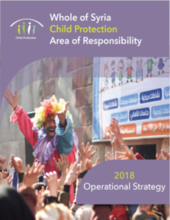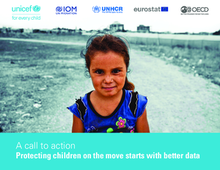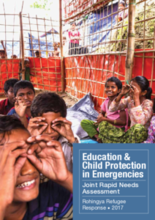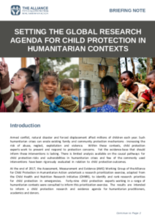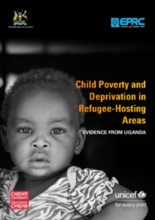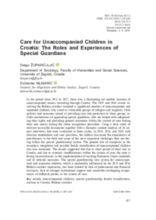Displaying 281 - 290 of 530
Based on primary and secondary source materials, this article traces the evolution of the US social work field's response to the needs of unaccompanied immigrant and refugee youth during the past two centuries.
This report from the Child Protection Area of Responsibility (CP AoR) highlights the child protection needs and responses in Syria and includes objectives and targets for continued child protection interventions and strategies.
This paper presents a community based participatory research project, which adopted a photovoice approach with seven unaccompanied asylum-seeking children (UASC) living in foster care in the United Kingdom.
In this call to action, UNICEF, UNHCR, IOM, Eurostat and OECD show how crucial data are to understanding the patterns of global migration and developing policies to support vulnerable groups like children.
From ethnographic research with unaccompanied children in the United States and Guatemala, this paper explores emergent and, at times, conflicting narratives of care that young migrants encounter while in U.S. federal custody.
The main objective of this Joint Rapid Education and Child Protection Need Assessment (JRNA) was to identify education and child protection needs, priorities and capacities of Rohingya boys and girls in the camps, settlements and host community in Cox’s Bazar, Bangladesh to inform and provide the evidence-base for the 2018 Joint Response Plan (JRP).
As part of the "Children Come First: Intervention at the border" project, Save the Children Italy elaborates and disseminates, on a quarterly basis, a dossier containing quantitative and qualitative information (profiles) relating to migrant minors entering Italy. This dossier contains information relating to the last quarter of 2017.
This Briefing Note outlines the priority areas for the Global Research Agenda, laid out by the Assessment, Measurement and Evidence (AME) Working Group of the Alliance for Child Protection in Humanitarian Action.
This study assessed child poverty, deprivation and social service delivery in refugee and host communities in selected districts in the country’s three major refugee-hosting areas: West Nile, a sub-region of Northern region that borders South Sudan; the country’s South West, which borders the DRC and Rwanda; and the capital, Kampala.
Special guardians have been tasked with safeguarding the rights of unaccompanied minors in Croatia and providing general assistance within the system of care during their stay and/or during the status recognition procedure. The authors of this study discussed the experiences of practitioners in the field and some of the most important challenges they are facing within the special guardianship system.

